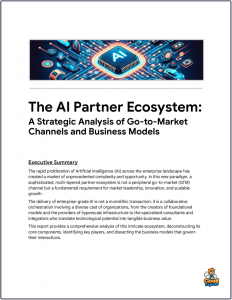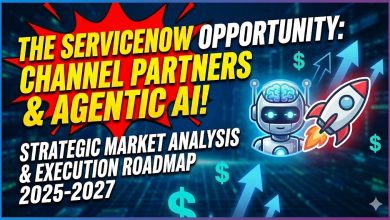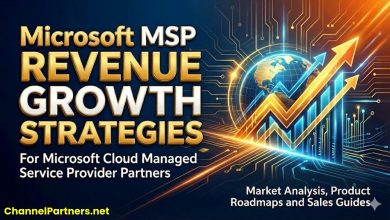Grow Your Partner AI Practice: Unlocking Scale for AI Transformations
Hear what sets Azure’s tech stack apart from the rest for AI to achieve this; what works—and what wins—from Microsoft and partner leaders.
 Discover how partners can help their customers turn business ideas into real impact – with AI apps and agents.
Discover how partners can help their customers turn business ideas into real impact – with AI apps and agents.
Learn proven strategies for helping customers build AI Centers of Excellence, scale success, and transform organizations with Azure’s full-stack capabilities.
At Microsoft Ignite 2025, a compelling session titled “Grow Your Partner AI Practice: Unlocking Scale for AI Transformations” featured experts Swapnil Khopkar (leading AI Apps GTM Scale Engines), Kirill Kotlyarenko (heading AI partner strategy for enterprise in Azure AI), and Charlie Doubek (from Entity Data).
Their discussion illuminated actionable strategies for partners to not only build but scale AI practices amid surging demand for agentic AI, low-code innovations, and secure, compliant deployments.
The Evolution of AI Scaling Patterns: From Pilots to Enterprise Impact
Over the past two years, AI adoption has shifted from experimental pilots to orchestrated, enterprise-grade transformations. As Khopkar emphasized, patterns have matured into repeatable frameworks that span horizontal use cases—like summarization and customer self-service—and vertical applications tailored to industries such as financial services or manufacturing.
Key to unlocking scale is identifying a “golden use case”—a high-value scenario that delivers immediate ROI, such as automating compliance checks in finance or optimizing supply chain forecasting in retail.
From there, partners can expand by scaling proven patterns across departments, leveraging agentic AI to “stack” value. Agentic workflows, powered by multi-agent models, enable autonomous decision-making, elevating outcomes from single-task automation to holistic process reimagining.
Consider the four buckets of frontier AI transformation outlined in the session:
- Automating Core Processes: Streamline internal and customer-facing operations, reducing turnaround times by 30-50% through intelligent agents.
- Empowering Teams: Equip knowledge workers with AI co-pilots for enhanced collaboration and productivity.
- Proactive Insights: Deploy agents that surface real-time intelligence without manual reporting, driving agility in dynamic markets.
- Developer Acceleration: Integrate agentic DevOps to speed up code generation and deployment cycles.
Yet, challenges persist: from scenario discovery and proof-of-concept (POC) validation to foundational hurdles like data governance and security. Doubek highlighted how partners often underestimate the “decomposition of the stack,” overlooking opportunities in technical building blocks (e.g., knowledge mining via Azure AI Search), build decisions (low-code vs. pro-code), and treating data as a product through Microsoft Fabric.
Microsoft’s Packaged IP: Tools and Frameworks for Rapid Scaling
Microsoft’s ecosystem provides partners with battle-tested intellectual property (IP) to bypass common roadblocks and accelerate go-to-market (GTM) strategies. Central to this is the AI Pattern Scorecard, a diagnostic tool that visualizes transformation progress across the four buckets. It prioritizes initiatives by aligning core business metrics—such as cost savings or engagement uplift—with feasibility scores, ensuring quick wins on lower-priority items (e.g., elevating a “priority 3” use case to production in weeks).
For technical scalability, the session introduced AI Landing Zone Architectures, reference blueprints for repeatable deployments. These come in two flavors:
- Platform Landing Zone: A comprehensive environment for hosting agentic AI workloads alongside other Azure services, adhering to Well-Architected Framework (WAF) and Cloud Adoption Framework (CAF) standards.
- AI Landing Zone: A lightweight, focused zone for isolating AI experiments, ideal for agile POCs before full integration.
Complementing these are accelerators available on accelerators.microsoft.com and Microsoft Foundry, including GitHub repos with deployment guides using Azure Developer CLI (AZD) and Bicep templates. Categories range from multi-agent orchestration to multimodal content processing, enabling partners to deploy solutions 40% faster.
Workshops form the human layer of scaling:
- AI Business Envisioning Workshop: A half-day session to co-create “Apps that Matter”—industry-specific packs on Partner Center that map challenges to patterns, outcomes, personas, and agentic architectures. For instance, the financial services pack addresses “Rome processing” (regulatory operations) with KPIs like 25% faster compliance audits.
- Agentic Capabilities for Scale Workshop: A full-day deep dive into whiteboarding solutions, readiness assessments, and MVP planning, often leading to funded POCs.
GenAI Ops further operationalizes this flywheel: ideation in sandboxes, building in test environments, and productionizing with monitoring via Azure AI Studio. Kotlyarenko stressed an agile foundations approach—addressing security, networking, and data iteratively, rather than in lengthy upfront projects—to avoid stalling transformations.
Real-World Partner Success: Lessons from Entity Data’s AI Factory
No discussion on scaling would be complete without practitioner perspectives. Charlie Doubek shared Entity Data’s journey in constructing an Identity AI Factory, starting with Copilot Studio and evolving into a multi-agent powerhouse for observability and accuracy.
Key examples:
- Insurance Transformation: Agents modeled against business goals, achieving 78% accuracy in fraud detection—up from 40%—by layering an orchestrator agent over data analyzers and output handlers.
- Retail IT Autonomy: For a 28,000-employee retailer, low-code agents handled sales interactions, while pro-code ones extracted legacy data via Fabric, averting costly migrations.
- Innovation Vetting: A manufacturer deployed agents to screen ideas against regulations, slashing invalid proposals by 60%.
- Black Friday Orchestration: Agents linked demand planning, logistics, and HR for temporary staffing, ensuring seamless scaling during peak loads.
Doubek’s mantra: Treat your own organization as “customer zero.” Build internal AI practices first to hone expertise, enforce service-level objectives (SLOs) on agents, and use multimodal AI for win/loss analysis. This internal flywheel—analyzing production metrics, blockers, and successes—fuels external growth.
AI as the Great Equalizer: Democratizing Transformation Across Segments
A pivotal insight: AI erodes traditional barriers between SMBs, mid-market, and enterprises. Low-code tools like Power Platform and Copilot Studio empower smaller partners to deliver sophisticated solutions, while pro-code options scale for Fortune 500 needs. As Khopkar noted, this inclusivity extends to assets like Apps that Matter, which partners can customize via researcher prompts or customer dialogues.
Funding mechanisms amplify this. The Azure Accelerate program offers co-sell incentives, expert access via the Cloud Accelerate Factory, and stage-gated funding from pre-sales envisioning to deployment—directly tying partner practices to deal closure.
Building Your AI CoE: Pillars for Sustainable Growth
To institutionalize these strategies, establish an AI Center of Excellence (CoE) grounded in five pillars:
- Business Strategy: Align AI with revenue goals, using scorecards for prioritization.
- Technology Strategy: Leverage landing zones and accelerators for secure, scalable foundations.
- Applied AI Experience: Foster hands-on workshops and POCs to build muscle memory.
- Organizational and Cultural Shifts: Promote “customer zero” adoption to drive buy-in.
- Governance: Embed compliance, monitoring, and ethical AI from day one.
Conclusion: Ignite Your Practice Today
The Microsoft Ignite session underscores a truth: Scaling an AI practice isn’t about chasing trends—it’s about orchestrating patterns, IP, and partnerships into a virtuous flywheel. By embracing agentic AI, Microsoft’s tools, and real-world learnings, partners can unlock double-digit business impacts, from productivity surges to compliance breakthroughs.
Start small: Run an AI Envisioning Workshop with your team, pilot an Apps that Matter pack, and apply for Azure Accelerate funding. As Doubek aptly closed, “AI isn’t just a tool—it’s the equalizer that lets every partner transform at scale.” For those ready to lead the AI revolution, the runway is open. Dive into Partner Center, explore the accelerators, and position your practice as the indispensable ally in your clients’ journeys.



